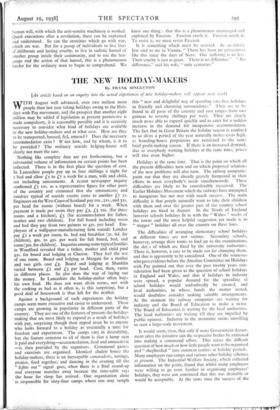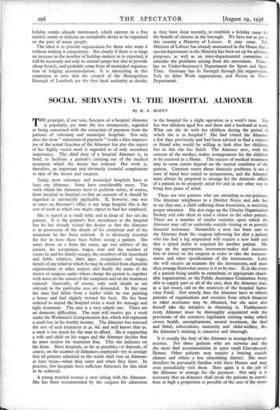THE NEW HOLIDAY-MAKERS
By FRANK SINGLETON
[An article based on an enquiry into the actual experiences of new holiday-makers will cppear next week] WITH August well advanced, over two million more people than last year taking holidays owing to the Holi- days with Pay movement, and the prospect that another eight million may be added if legislation at present permissive is made compulsory, it is reasonably possible and it is certainly necessary to consider what kind of holidays are available to the new holiday-makers and at what cost. How are they to be transported, housed, fed, amused ? Does the necessary accommodation exist ? If not how, and by whom, is it to be provided ? The ordinary seaside lodging-house will clearly not meet the case.
Nothing like complete data are yet forthcoming, but a substantial volume of information on certain points has been collected. There is in the first place the question of cost. In Lancashire people pay up to four shillings a night for a bed and allow £5 to £7 a week for a man, wife and child, not including amusements. A recent newspaper inquiry confirmed £5 ios. as a representative figure for other parts of the country and estimated that the amusements and sundries typical of seaside resorts came to another £t 5s. Engineers on the West Coast of Scotland pay IOS.,2Is., and 35s. per head for rooms (without board) for a week. When payment is made per room they pay £3, £3 los. (for three rooms and a kitchen), £5 (for accommodation for father, mother and two children). For full board including room and bed they pay from two guineas to 45s. per head. Em- ployees of a wallpaper-manufacturing firm outside London pay £t a week per room, 6s. bed and breakfast (2s. 6d. for children), 4os. to 45s. per week for full board, bed, and room (3os. for children). Inquiries among some typical families in Woodford revealed that a father, mother and child paid 45s. for board and lodging at Clacton. They had the use of one room. Board and lodging at Margate for a mother and two girls cost £3. Board and lodging at Shanklin varied between £2 and £5 per head. Cost, then, varies in different places. So also does the way of laying out the money. In Lancashire the holiday-maker often buys his own food. He does not want all-in terms, nor with the cooking as bad as it often is, is this surprising, but a good deal of housework is thus left for the mother.
Against a background of such experiences the holiday camps seem more attractive and easier to understand. These camps are growing in popularity in different parts of the country. They are one of the features of present-day holiday- making that are most likely to expand as a result of holidays with pay, surprising though their appeal must be to anyone who looks forward to a holiday as essentially a time for freedom and experiment. The camps vary in desirability, but the feature common to all of them is that a lump sum is paid and everything—accommodation, food and amusement —is then provided by the organisers. Communal games and exercises are- organised. Identical chalets house the holiday-makers, there is an inescapable camaraderie, outings, picnics, food together, and dancing in the evening till the " lights out " signal goes, when there is a final round-up and everyone marches away because the time-table says the hour for sleep has arrived. One organisation alone is responsible for sixty-four camps where one may sample this " new and delightful way of spending care-free holidays in friendly and charming surroundings." They are to be found in all parts of the country and cost ranges from two guineas to seventy shillings per week. They are clearly much more able to expand quickly and to cater for a sudden increase in the demand for inexpensive accommodation. The fact that in Great Britain the holiday season is confined to so short a period of the year naturally makes costs high, as boarding-house proprietors are restricted to the same brief profit-making season. If there is an increased demand, due to everybody wanting holidays at the same time, prices will rise even higher.
Holidays at the same time. That is the point on which all the present difficulties turn and on which proposed solutions of the new problems will also turn. The railway companies point out that they are already gravely hampered in their efforts to meet everybody's needs simultaneously. These difficulties are likely to be considerably increased. The Earlier Holidays Movement which the railways have attempted to inaugurate has not met with much success. The main difficulty is that people naturally want to take their children with them and over the greater part of the country school holidays are fixed in August. In the North of England however schools holidays fit in with the " Wakes " weeks of the towns and the most helpful suggestion yet made is to " stagger " holidays all over the country on these lines.
The difficulties of arranging elementary school holidays at different times are not serious. Secondary schools, however, arrange their terms to lead up to the examinations, the dat s of which are fixed by the university authorities. There is, however, a case to be made out for changing them, and that is apparently to be considered. One of the witnesses who gave evidence before the Amulrec Committee on Holidays with Pay pointed out that over the past twenty years con- sideration had been given to the question of school holidays in England and Wales, and that if holidays in industry were spread, a popular demand for the spreading of school holidays would undoubtedly be created, and lol 'authorities, in whose hands the matter rested, would doubtless consider making suitable arrangements. At the moment the railway companies - are waiting for industry and the Board of Education to make a move. The Board of Education is waiting for the local authorities. The local authorities are waiting till they are impelled by public opinion. Industry in the meantime seems unwilling to start a large-scale movement.
It would seem, then, that only if some Government depart- ment takes the initiative can the respective bodies be animated into making a communal effort. This raises the difficult question of how much or how little people want to be organised and " shepherded " into common centres at holiday periods. Many employers run camps and various other holiday schemes at present. The Industrial Welfare Society, which collected information on the point, found that whilst many employers were willing to go even further in organising employees' holidays, they were not convinced that this was desirable or would be acceptable. At the same time the success of the holiday camps already mentioned, which operate in a free market, seems to indicate an unshakable desire to be organised on the part of many people.
The ideal is to provide organisation for those who want it without making it compulsory. But clearly if there is as large an increase in the number of holiday-makers as is expected, it will be necessary not only to extend camps but also to provide cheap hostels, and probably some form of municipal organisa- tion of lodging accommodation. It is interesting in this connexion to note that the council of the Metropolitan Borough of Lambeth are the first local authority to decide, as they have done recently, to establish a holiday camp for the benefit of citizens in the borough. We have not as yet in this country a Ministry of Leisure. It may come. The Minister of Labour has already announced in the House that a special department in the Ministry has been set up for advisory purposes, as well as an inter-departmental committee to consider the problems arising from the movement. France has an Under .Secretary's Department for Sport and Spare Time. Germany has its Strength through Joy organisation, Italy its After Work organisation, and Russia its Tours Department.







































 Previous page
Previous page